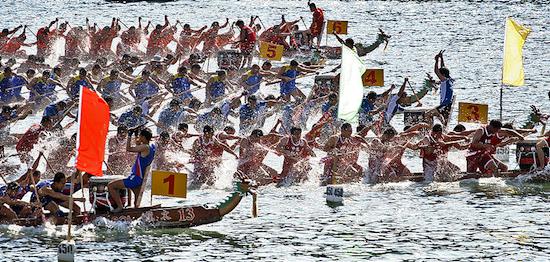China’s National Dragon Boat Holiday
Jun. 11 – China Briefing readers should be aware that most Mainland China offices will be closed next week from Monday-Wednesday due to the Dragon Boat Festival taking place. This is a national holiday, and offices on the mainland will reopen on Thursday, June 17.
The Dragon Boat Festival, also known as Duanwu, commemorates the life and death of the famous Chinese scholar Qu Yuan, a loyal minister that served the King of Chu during the Warring States Period in the third century B.C. Initially, his sovereign favored Qu Yuan, but over time, his wisdom and erudite ways antagonized the other court officials. He was jailed on a trumped up a charge of conspiracy, and ejected by his sovereign. During the exile, Qu Yuan made many poems to express his anger and sorrow of his sovereign and people.
In the year 278 B.C., at the age of 37, Qu Yuan drowned himself in the Milo River. He clasped a heavy stone to his chest and leaped into the water. Knowing that Qu Yuan was a righteous man, the people of Chu rushed to the river to try to save him. The people desperately searched the waters in their boats looking for Qu Yuan, but they were unsuccessful in their attempt to rescue him. Every year the Dragon Boat Festival is celebrated to commemorate this attempt at rescuing Qu Yuan. When it was known that Qu Yuan had been lost forever, the local people began the tradition of throwing sacrificial cooked rice into the river for their lost hero. However, a local fisherman had a dream that Qu Yuan did not get any of the cooked rice that was thrown into the river in his honor. Instead, it was the fishes in the river that had eaten the rice. And so, the locals decided to make zongzi to sink into the river in the hopes that it would reach Qu Yuan’s body. The following year, the tradition of wrapping the rice in bamboo leaves to make zongzi began.
“I once rowed for the Lamma Island team in the Hong Kong races in Victoria Harbor, near to the Shun Tak Center, back in 1990,” says Chris Devonshire-Ellis. “With a bunch of other expatriates, we had trained for several weeks and surprised many contestants and spectators by finishing third in the first event and thereby qualifying for the next round. The first race had been raced with another nine teams. We didn’t make it past the next round, but our third place in the initial event was enough to secure a prize of a whole large roast suckling pig which we devoured with relish and several Tsingtao beers on the ferry back to Lamma. It was a great day out and it is well worth going to compete and to watch.”
- Previous Article State Council Approves Shenzhen SEZ Expansion
- Next Article China Intensifies Monitoring of Cross-Border Capital Flows










